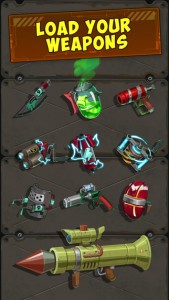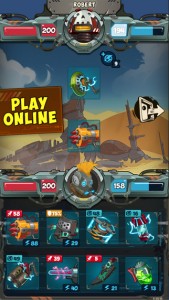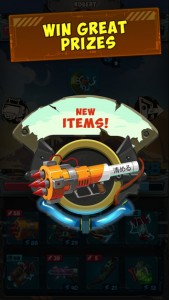These days it’s a wretched wasteland out there in the desert, which is why people are desperately fighting over whichever bits and baubles of usable scrap they can dredge up. Thus goes the premise to Scavenger Duels (out now, free), a relatively simple — yet surprisingly deep — game of “Collectible Weapon” based combat from Tryad Games. Despite what it might initially look like, this most certainly is not yet another one of those “Digital Card Games” that have become an overly-clustered dime-a-dozen on the mobile marketplace.
 The first significant difference players will likely notice is that their deck of equipment — to be henceforth known as the tool-bag — is always available in its entirety, rather than the player ever suffering under the luck of any draw. The second thing you’re likely to notice is that all gizmos fall into one of three families: weapons (which attack), shields (which defend), and batteries (which restore your energy reserves). Although battery cards may always be freely played at any time, weapons and shields may only be used so long as the player currently has enough power stored up (which is generally earned with batteries).
The first significant difference players will likely notice is that their deck of equipment — to be henceforth known as the tool-bag — is always available in its entirety, rather than the player ever suffering under the luck of any draw. The second thing you’re likely to notice is that all gizmos fall into one of three families: weapons (which attack), shields (which defend), and batteries (which restore your energy reserves). Although battery cards may always be freely played at any time, weapons and shields may only be used so long as the player currently has enough power stored up (which is generally earned with batteries).
Spicing things up a bit are many pieces of gear that can cause conditional effects, such as weapons causing status-effects — like HP poisoning, or even energy drain — if their attack isn’t blocked by a shield. Meanwhile some of the shields will not just block a percentage of the incoming damage, some of them will also do other things — such as counter attack — if they’re properly used during a round when your opponent was attacking you. Batteries — on the other hand — are down right dangerous — and cause rather unfortunate things to happen if you’re attacked while using one, such as increasing the damage you receive.
This probably seems — just like I said at the review’s beginning — fairly straight forward so far, and the rules to Scavenger Duels admittedly are some of the easiest you’ll ever see: each round both players select a card, and the loser is the one who runs out of HP first. What must be understood — however — is that not only do you not know which card your online opponent will play next, but you also don’t know the entirety of his tool-bag’s contents either. Although IAP options do exist, this is a game where — thanks to proper balancing — getting inside your opponent’s head is infinitely more vital than whatever nasty trinkets you might be secretly carrying.
 Let’s presume that you have finally saved up the massive amount of energy needed to fire your super-poison-rocket, and yet you furthermore know that your opponent has just barely enough energy to use his shield this round. Furthermore — because you’ve seen it used earlier — you know that your opponent’s shield can convert all of the damage it blocks into pure energy, something to keep in mind as you ready such a large attack. Although this shield might sound annoying, there is a risk in your opponent using it: if you correctly predict that he thinks you’re going to attack, you could your battery again while he wastes the last of his precious energy on the attack that never came.
Let’s presume that you have finally saved up the massive amount of energy needed to fire your super-poison-rocket, and yet you furthermore know that your opponent has just barely enough energy to use his shield this round. Furthermore — because you’ve seen it used earlier — you know that your opponent’s shield can convert all of the damage it blocks into pure energy, something to keep in mind as you ready such a large attack. Although this shield might sound annoying, there is a risk in your opponent using it: if you correctly predict that he thinks you’re going to attack, you could your battery again while he wastes the last of his precious energy on the attack that never came.
Do you hold back expecting your opponent to block, knowing afterwards you’ll be able to shoot him when he’s forced to used a battery (knowing full well that batteries inflict bonus damage when attacked)? Or do you attack — realizing that your opponent thinks you believe he’ll block — because you run the risk of him using a battery instead if you don’t strike, after which he’ll be ready to launch an attack of his own? Perhaps you don’t want him to launch even the weakest counterattack right now, despite the fact your rocket would obliterate him, as your foe’s power is low only because he just decimated your HP.
It’s at times like these where you’re going to have to make some serious life-or-death judgment calls, and you’d best be quick about them or else Scavenger Duels will take your inaction to mean you just willfully skipped your turn.
After a match has ended you’ll both receive a pile of scrap, with the winner obviously getting far more scrap than the embarrassed person he just cleaned the proverbial floors with (the size of these pools will increase — for both parties — as you climb up the ladder). Players can additionally earn scrap by completing various challenges that come up, including: successfully block so much damage (across multiple matches), successfully deal so much damage (ditto), successfully win so many matches, and other such things. The two things players can spend this scrap on are random gizmo boxes (which always cost 1000 scrap each), as well as bigger and better bags (each of which furthermore come with a single new randomly selected gizmo, and cost more than previous bag).
 Now while having super powerful gizmos can be fun, they will never — by themselves — tip the tide of war since better gear always costs more energy to use, and trying to charge up a massive energy pool always puts you at risk of getting your batteries blasted. Furthermore — despite their power — the nastiest weapons are still just as blockable with shields, and — depending on the shield used — may even backfire worse in your face when your opponent successfully predicts your mind. So even if a player does use IAPs to buy up a ton of crates to find the most OP weapons in existence, their results will still only be as good as someone’s ability to otherwise confuse and confound their opponents.
Now while having super powerful gizmos can be fun, they will never — by themselves — tip the tide of war since better gear always costs more energy to use, and trying to charge up a massive energy pool always puts you at risk of getting your batteries blasted. Furthermore — despite their power — the nastiest weapons are still just as blockable with shields, and — depending on the shield used — may even backfire worse in your face when your opponent successfully predicts your mind. So even if a player does use IAPs to buy up a ton of crates to find the most OP weapons in existence, their results will still only be as good as someone’s ability to otherwise confuse and confound their opponents.
What can — however — have an impact on someone’s performance is the size of their bag, since the more gizmos you can lug into a match will greatly impact the number of contingencies you can plan for. Furthermore — seeing as how your opponent will only be aware of gizmos you’ve already used at least once — a larger bag makes it easier to keep an ace in the hole, giving you increased opportunities to catch you opponent off guard. That said, buying your way to a larger bag earlier on still won’t change the fact that having a bigger hand — and actually knowing how to successfully use it — are two vastly different things (and free players can always grind for these without IAPs as well).
About the only real downside here — although some of you probably saw this coming — is that this game is exclusively online only, which can be rather limiting for those not playing Scavenger Duels on an iPhone. Although there does exist a short single player campaign — meant to both introduce players to the mechanics, and provide them with some starting salvage as well — this too must be played online. Although those without iPhones can still play the game, their mobility will be greatly restricted to places that have openly available Wi-Fi hotspots (thankfully all matches tend to be fairly short).
All in all — though — assuming you either own an iPhone, or at the very least have reliable access to some Wi-Fi hotspots, fans of online strategy games just might want to check Scavenger Duels out (it is free, after all).
Verdict
Scavenger Duels is a rather unique — yet fiercely balanced — take on the entire mobile card-battling genre, containing a deceptively simple set of combat rules (wherein all cards are either weapons, shields, or batteries). What truly sets this game apart from its — sometimes deplorable — contemporaries would be how the cards themselves almost don’t matter at all, rather than your ability to read your opponent. The only downside for Scavenger Duels is the inherent dilemma of having an online card-battling game in the first place, meaning that people will need to always maintain some form of online access if they wish to get their dueling on.


